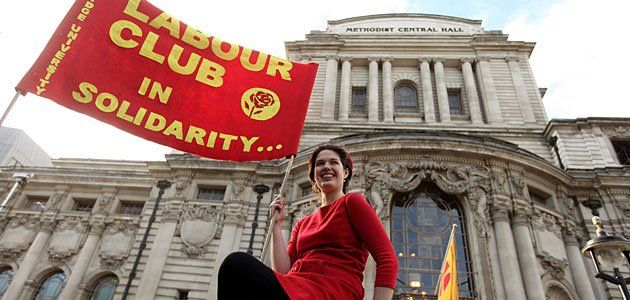
Britain's unions have good cause for concern. The spending cuts announced this week by the country's coalition government will mean the loss of 490,000 jobs in the public sector over the next four years, according to estimates cited by the government itself. Already, pay has been frozen, and those who keep their posts will see a hefty rise in their mandatory pension contributions. That's not to mention the impact of other measures in the austerity package, whether it's, say, higher rail fares or changes in the retirement age.
Small wonder that union leaders are ramping up the rhetoric. In the words of Mark Serwotka, general secretary of the Public and Commercial Services Union: "Action is inevitable. When an attack on this scale is unleashed, what else can we do?" A campaign of protest is being coordinated by the Trades Union Congress (TUC), which plans a national rally in central London next March.
But the unions' concern may take another form. How much public support do they really enjoy? In the first place, the cuts have still to take effect. It may be months or years before jobs start to disappear in serious numbers. Even then, many will go through natural attrition rather than forced layoffs. More important, there's little evidence of mass opposition to the cuts. A survey this week found that 58 percent of voters believed there was no alternative to the spending review, while barely half that figure reckoned that it was avoidable. Furthermore, only 17 percent blamed the present coalition for the need to cut spending—against 47 percent who fingered the Labour government that lost office this spring.
For state workers, the struggle for sympathy may prove especially hard. The 13 years of Labour rule saw a huge expansion in the public sector with the creation of more than 900,000 jobs. Rightly or not, private-sector staff believe that so far they've borne the brunt of the financial crisis, while civil servants—enjoying the prospect of generous pensions—have been largely protected.

At a deeper level, there's simply little appetite for militancy, especially the left-wing brand peddled by the leaders of some of the best-known unions. This isn't France, nor is it the 1970s, when union action brought chaos to Britain. To stage a strike that disrupted rail services or gas supplies would be to risk an extreme counter-reaction from the public. These days the unions can be an embarrassment to their natural allies in politics. It's noticeable that Labour's new leader, Ed Miliband, opted to stay away from last week's union-organized rally on the eve of the cuts statement.
The unions themselves have been sidelined as a political force since laws introduced under Margaret Thatcher in the 1980s put strict limits on the scope of industrial action. In 2009, union membership as a proportion of the total workforce stood at 27 percent—down from more than 55 percent in 1979, partly thanks to the changing nature of employment, particularly the long-term decline of heavy industry. (That said, more than half of public-sector workers remain union members.) According to the general secretary of the TUC, Brendan Barber, the government's cuts will make Britain a "more unequal, more squalid, and nastier country." Maybe so, but it's hard to argue that he's speaking for that country.
Uncommon Knowledge
Newsweek is committed to challenging conventional wisdom and finding connections in the search for common ground.
Newsweek is committed to challenging conventional wisdom and finding connections in the search for common ground.





